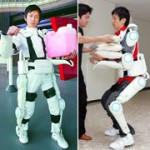Archive for Октябрь, 2006
Начинается массовое производство кибернетических костюмов
- Тип контента: Новостная статья
- Номер документа: 1999
- Название документа: Начинается массовое производство кибернетических костюмов
- Номер (DOI, IBSN, Патент): Не заполнено
- Изобретатель/автор: Не заполнено
- Правопреемник/учебное заведение: Не заполнено
- Дата публикации документа: 2006-10-30
- Страна опубликовавшая документ: Россия
- Язык документа: Русский
- Наименование изделия: Не заполнено
- Источник: http://www.membrana.ru/particle/10777
- Вложения: Не заполнено
- Аналитик: Ридна Украина)))
 О том, что пятое поколение роботизированных костюмов HAL (Hybrid Assistive Limb) готово к серийному производству и продаже, сообщили японские специалисты из университета Цукубы (Tsukuba University). Также они рассказали, во сколько обойдётся HAL-5 покупателям и арендаторам.
О том, что пятое поколение роботизированных костюмов HAL (Hybrid Assistive Limb) готово к серийному производству и продаже, сообщили японские специалисты из университета Цукубы (Tsukuba University). Также они рассказали, во сколько обойдётся HAL-5 покупателям и арендаторам.
Категория: HAL 5 | Нет комментариев »
Gravity balanced orthosis apparatus
- Тип контента: Патент
- Номер документа: 4208
- Название документа: Gravity balanced orthosis apparatus
- Номер (DOI, IBSN, Патент): US2006/0241539A1
- Изобретатель/автор: Agrawal, S.K., Banala, S.K., Fattah, A.
- Правопреемник/учебное заведение: Univ. of Delaware, Newark, DE, USA
- Дата публикации документа: 2006-10-26
- Страна опубликовавшая документ: США
- Язык документа: Английский
- Наименование изделия: Не заполнено
- Источник: http://www.google.com/patents/about/7544155_Gravity_balanced
- Вложения: Да
- Аналитик: Дмитрий Соловьев
 Passive gravity balancing orthosis apparatus for assisting and training patients suffering from muscle weakness by relieving the patients afflicted member of its weight using a plurality of articulated supporting members. Relief is obtained by identifying and fixing the center of mass of the combined articulated equipment members and supported weight of the patient’s member in space using a defined parallelogram mechanism and once so identified making the total potential energy for any configuration of the articulated members of the system constant. At least one zero free length spring is used to connect the center of mass to a support outside the articulated members. Additional springs connect the center of mass to the articulated members.
Passive gravity balancing orthosis apparatus for assisting and training patients suffering from muscle weakness by relieving the patients afflicted member of its weight using a plurality of articulated supporting members. Relief is obtained by identifying and fixing the center of mass of the combined articulated equipment members and supported weight of the patient’s member in space using a defined parallelogram mechanism and once so identified making the total potential energy for any configuration of the articulated members of the system constant. At least one zero free length spring is used to connect the center of mass to a support outside the articulated members. Additional springs connect the center of mass to the articulated members.
Категория: Патенты | Нет комментариев »
Real-Time Myoprocessors for a Neural Controlled Powered Exoskeleton Arm
- Тип контента: Научная статья
- Номер документа: 340
- Название документа: Real-Time Myoprocessors for a Neural Controlled Powered Exoskeleton Arm
- Номер (DOI, IBSN, Патент): 10.1109/TBME.2006.880883
- Изобретатель/автор: Rosen, J., Perry, J.C., Cavallaro, E.E., Burns, S.
- Правопреемник/учебное заведение: Dept. of Electr. Eng., Univ. of Washington, Seattle, WA
- Дата публикации документа: 2006-10-16
- Страна опубликовавшая документ: США
- Язык документа: Английский
- Наименование изделия: Не заполнено
- Источник: http://ieeexplore.ieee.org/search/freesrchabstract.jsp?tp=&a
- Вложения: Да
- Аналитик: Дмитрий Соловьев
 Exoskeleton robots are promising assistive/rehabilitative devices that can help people with force deficits or allow the recovery of patients who have suffered from pathologies such as stroke. The key component that allows the user to control the exoskeleton is the human machine interface (HMI). Setting the HMI at the neuro-muscular level may lead to seamless integration and intuitive control of the exoskeleton arm as a natural extension of the human body. At the core of the exoskeleton HMI there is a model of the human muscle, the «myoprocessor,» running in real-time and in parallel to the physiological muscle, that predicts joint torques as a function of the joint kinematics and neural activation levels. This paper presents the development of myoprocessors for the upper limb based on the Hill phenomenological muscle model. Genetic algorithms are used to optimize the internal parameters of the myoprocessors utilizing an experimental database that provides inputs to the model and allows for performance assessment. The results indicate high correlation between joint moment predictions of the model and the measured data. Consequently, the myoprocessor seems an adequate model, sufficiently robust for further integration into the exoskeleton control system.
Exoskeleton robots are promising assistive/rehabilitative devices that can help people with force deficits or allow the recovery of patients who have suffered from pathologies such as stroke. The key component that allows the user to control the exoskeleton is the human machine interface (HMI). Setting the HMI at the neuro-muscular level may lead to seamless integration and intuitive control of the exoskeleton arm as a natural extension of the human body. At the core of the exoskeleton HMI there is a model of the human muscle, the «myoprocessor,» running in real-time and in parallel to the physiological muscle, that predicts joint torques as a function of the joint kinematics and neural activation levels. This paper presents the development of myoprocessors for the upper limb based on the Hill phenomenological muscle model. Genetic algorithms are used to optimize the internal parameters of the myoprocessors utilizing an experimental database that provides inputs to the model and allows for performance assessment. The results indicate high correlation between joint moment predictions of the model and the measured data. Consequently, the myoprocessor seems an adequate model, sufficiently robust for further integration into the exoskeleton control system.
Категория: Научные статьи | Нет комментариев »
Статистика
Категорий: 179
Статей всего: 2,003
По типу:
Видео: 36
Выдержка с форума: 1
Контактные данные: 12
Научная статья: 1388
Не заполнено: 5
Новостная статья: 317
Обзор технологии: 42
Патент: 219
Тех.подробности: 34
Тип: 1
Комментариев: 10,011
Изображений: 3,005
Подробней...
ТОР 10 аналитиков
-
Глаголева Елена - 591
Дмитрий Соловьев - 459
Helix - 218
Ридна Украина))) - 85
Наталья Черкасова - 81
max-orduan - 29
Елена Токай - 15
Роман Михайлов - 9
Мансур Жигануров - 4
Дуванова Татьяна - 3
Календарь
Авторизация
Ошибка в тексте?
Выдели её мышкой!
И нажми Ctrl+Enter